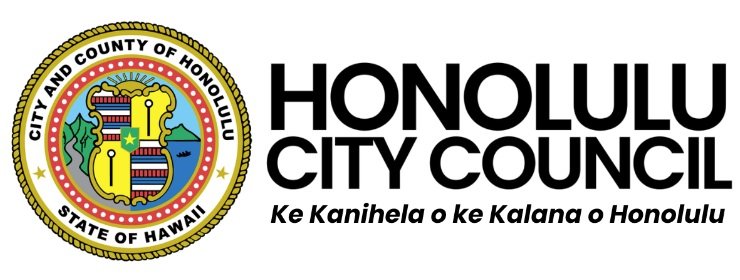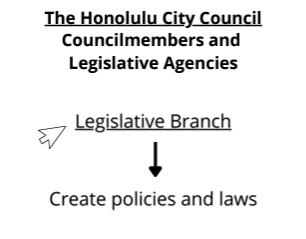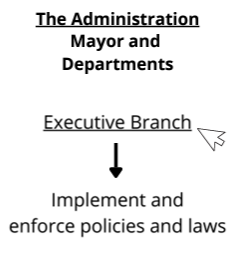
Lawmaking 101
Ordinances, or new City laws, start with the creation of a bill. For a bill to become a law, it must be approved by the City Council at three separate meetings, or readings. After the bill passes its third and final reading, the bill is presented to the mayor for a signature.
If the bill is not vetoed by the mayor, it becomes an ordinance and joins the existing code of law for the City, the Revised Ordinances of Honolulu (ROH).
Resolutions express the City Council's opinion or the City's policy on an issue or subject. They can also request an action by the City Administration or State government..
Proposed Charter Amendments are voted upon by the people of the City and County of Honolulu in general elections. Councilmembers can propose a charter amendment via a resolution subjected to three hearings and a supermajority vote, that may result as an ordinance. For example, the Honolulu Youth Commission was a proposed charter amendment, voted into city law by the public in 2020.
Click to view: Honolulu City Charter and other Guiding Documents.
The City and County of Honolulu balance of power and jurisdictions.
FAQs
What is the most effective way to advocate on an issue?
- Tell your councilmember why an issue is important to you and how it affects the community:
- Find your councilmember by searching your district (click here).
- You have the options to: Call and/or email their office.
- Tell them your name, your zip code and the issue that is important to you. Tell them how you would like this issue to be addressed, ask them any questions you have.
- Submit written and/or oral testimony on an agenda item addressing a specific city issue (click here).
How do I stay updated on specific legislation?
- Sign up for meeting agendas (click here). Notifications are sent directly via email. You are able to unsubscribe anytime.
- Because of our Sunshine Law, agendas are available to the public six days before a council or committee meeting, giving you time to prepare testimony on a specific agenda item (resolution, bill, appointment of a nominee).
When is Council in session?
- All year. Regularly scheduled full council meetings occur once a month on Wednesdays at 10 a.m. Council committees meet toward the end of each month.
- Special council or committee meetings may be called at any time when deemed necessary.
- In any year, about 300 to 350 resolutions and 70 to 80 bills are introduced for consideration by the city council.
What is a lobbyist? How do I register as a lobbyist?
- A lobbyist is a person who is paid by an entity to influence legislation.
- Lobbyists must file a registration form with the Honolulu Ethics Commission. You can (1) email your completed form to the commission at ethics@honolulu.gov (attach your form as a PDF to your email), or (2) deliver or mail your completed paper form to the Honolulu Ethics Commission, 925 Dillingham Boulevard, Suite 190, Honolulu, Hawaii 96817.
- Lobbyist Registration Form
- Lobbying FAQ’s
What is the Sunshine Law?
- The Sunshine Law requires council members to discuss legislation within a public setting. Councilmembers are not allowed to discuss legislation behind closed doors. Due to this law, the public receives notice of a council or committee meeting six days in advance.
- Exceptions to this law relate to city lawsuits, which are discussed privately by the EMLA committee, city attorneys and the suing party.
What is the difference between the Council and the Administration?
The Council is the legislative body that makes laws. The Administration is the executive body, which implements the laws. While they have different roles, they are coordinate branches meaning they are legally given equal weight and rank according to the City and County of Honolulu’s Charter.
Nine Councilmembers, Clerk, Auditor and Office of Support Services make up the Legislative Agencies (link to LA page) of the Honolulu City Council. Councilmembers are appointed four year terms, and are limited to two consecutive full terms. They are elected by the people of the city.
The Council is responsible for determining policies and programs for the City and the enactment of ordinances (city laws) and the adoption of resolutions that influence public and county policy.
Duties of the Council include:
Organizing and conducting business
Holding regular meetings open to the public
Adopting annual city budgets
Confirming appointees of the mayor
Appointing members of commissions
Passing ordinances and resolutions (legislation)
The Administration consists of the mayor, Managing Director, Corporation Counsel and the city's numerous agencies. The mayor serves as the chief executive officer of the City and County of Honolulu’s government and exercises direct supervision over agencies when such arrangement is provided in the Charter or deemed desirable. The mayor also exercises supervision, through the Managing Director, of city agencies.
The mayor is elected into a four year term, and is limited to two consecutive full terms. They are elected by the people of the city.
Duties of the mayor include:
Organizing and conducting business
Appointing and removing administrators and department heads
Wielding veto power over legislation passed by the Council
Controling implementation of the budget
Administering the City and County of Honolulu’s COVID-19 response plan in accordance to the State Governor's orders.
There are four counties, municipal or “local” government entities in Hawaiʻi: (links to their websites) City and County of Honolulu (Oʻahu) County of Hawaiʻi (Hawaiʻi) County of Kauaʻi (Kauai, Niʻihau, Lehua, and Kaʻula ) County of Maui (Maui, Lānaʻi, Molokaʻi, Kahoʻolawe, and Molokini)
Counties are large political subdivisions of the state, measured by population via the Census data that is taken and recorded every 10 years as the population changes. Counties must be granted power by the State, meaning all ordinances passed by the city council must be consistent with the laws and Constitution at the State level and all of the laws and U.S. constitution at the Federal level .
The Hawaiʻi State constitution (Article 8) authorizes the Counties to adopt charter’s for their own self government. The counties Chater’s are superior and take precedence over the State constitution in terms of how the counties are structured and how they organized themselves. Counties also have exclusive control of Real Property Tax, meaning all functions, powers and duties related to real property tax.
However Counties decide to structure their governments, they must still abide by State laws. County legislation cannot conflict with existing state law, therefore county legislation is “preempted” meaning it cannot extend into areas reserved for state legislation, such as public education or state highways.
Helpful Links:





